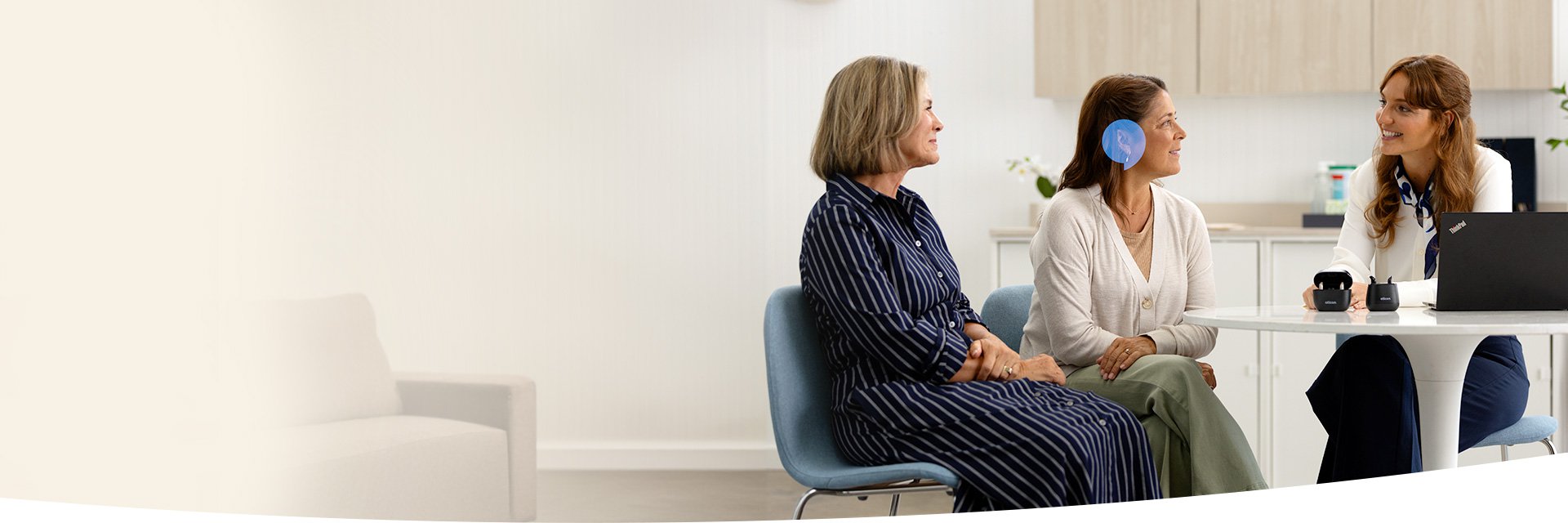Would you like to get your hearing tested for free?
Book a free comprehensive hearing test with same day results

The symptoms of hearing loss depend on the type, degree and cause of hearing loss.
If you recognise any of the below symptoms, we recommend getting a free hearing test at a hearing clinic near you.
If you or someone you know can relate to any of the signs of hearing loss listed above, then it may be an indication of hearing impairment, and you should get your hearing tested.
The degree of hearing loss refers to the severity of the loss and is generally categorised as either mild, moderate, severe, or profound
It can be measured in decibels (dB), referring to how loud sounds need to be for you to hear them.

Would you like to get your hearing tested for free?
Book a free comprehensive hearing test with same day results
Sensorineural hearing loss
The most common type of hearing loss is called sensorineural hearing loss. It can be caused by damage to tiny hair-like cells in the inner ear or damage to the auditory nerve. Often, this type of hearing loss can be treated with hearing aids.
Conductive hearing loss
This type of hearing loss comes from a mechanical problem in the middle or outer part of the ear. Conductive hearing loss can also be caused by an obstruction of some sort in the canal of the ear, such as earwax preventing sound from getting to the ear drum. It can be treated using hearing aids or other medical options.
Mixed hearing loss
Mixed hearing loss is when both aspects of sensorineural and conductive hearing loss are present.
Hearing loss is more common than you might think.
Understanding the source of your hearing issues gives our professionals insight into your needs, so we can advise you with the best options for your specific treatment. That's why we encourage you to speak with our experts as soon as you notice any hearing difficulties.
If you are looking for treatment for hearing loss, we advise you to begin the process as soon as possible.
It takes time for patients to come to terms with their diagnosis, and hearing loss is stigmatised. As an audiologist, I am all too aware of the impact of hearing loss on a patients social, psychological, and mental wellbeing; however, the patient will ultimately decide what is best for them.
Often, patients take time to process their diagnosis, make an informed decision and return for treatment. It thrills me to know when they are taking control of their hearing health.

Hearing loss treatments include: earwax removal, hearing aids, surgery, cochlear implants or bone anchored hearing solutions.
The best solution for your hearing loss will depend on:

While there is no cure for loss of hearing, there are steps you can take in preventing hearing loss and reducing your chances of developing hearing loss over the course of your lifetime.
1. Kochkin, Sergei (2009) ”MarkeTrak VIII: 25-Year Trends in the Hearing Health Market” The Hearing Review, vol. 16, no. 11.
2. McCormack, A. & Fortnum, H. Why do people fitted with hearing aids not wear them? Int J Audiol. 2013 May; 52(5): 360–368.
3. Chisolm, T. H., Johnson, C. E., Danhauer, J. L., Portz, L. J. P., Abrams, H. B., Lesner, S., … Newman, C. W. (2007). A
systematic review of health-related quality of life and hearing aids: Final report of the American Academy of Audiology Task
Force on the Health-Related Quality of Life Benefits of Amplification in Adults. Journal of the American Academy of Audiology,
18(2), 151-183
4. Masterson EA, Bushnell PT, Themann CL, Morata TC. Hearing Impairment Among Noise-Exposed Workers — United States, 2003–2012. MMWR Morb Mortal Wkly Rep 2016;65:389–394. DOI: http://dx.doi.org/10.15585/mmwr.mm6515a2
5. Haile et al. Hearing loss prevalence and years lived with disability, 1990–2019: findings from the Global Burden of Disease Study 2019. The Lancet. 2021 March. https://doi.org/10.1016/S0140-6736(21)00516-X